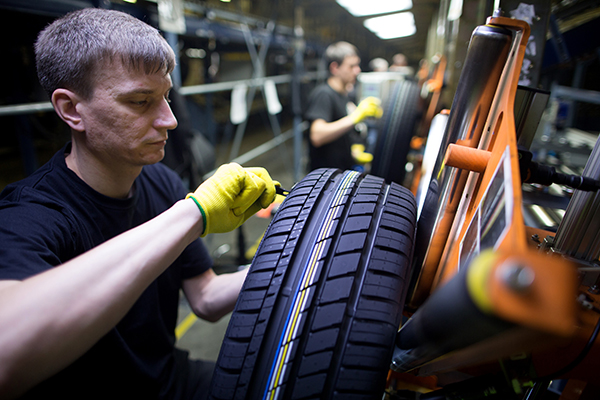Auto suppliers face challenge to innovate as megatrends emerge
By Li Fusheng | China Daily | Updated: 2018-02-05 14:01

Landscape of very profitable sector set to transform as new drivers come into prominence
Automotive suppliers, although in a lucrative game so far, may need to start reconsidering the road ahead-as megatrends including electrification and autonomous driving pick up speed to change the automotive landscape in major markets including China, according to a report.
"In this still favorable environment, the global supplier industry is expected to increase its revenues by 3 percent in 2017, with Chinese and NAFTA suppliers currently more profitable than the global average," said the Global Automotive Supplier Study 2018, compiled by consultancy firm Roland Berger and investment bank Lazard.
"For 2018, we expect to see continued growth for the global supplier base, but at a slower pace."
But looking out even further, the report said global trends in the automotive industry are to bring about dramatic changes in all current domains that suppliers are playing in-and will force them to change if they want to stay competitive.
One scenario is that new mobility business models will change car ownership, personal mobility and goods logistics. Under that scenario, at least 10 percent of new cars sold in the US and Europe and up to 35 percent in China by 2025 will be used for ride hailing and car sharing.
The report envisages that by 2025 electric vehicles will account for 8-20 percent of sales in the US and at least 29 percent in China.
It predicts that within 10 years almost all cars in mature markets will have some form of connectivity, and after 15-20 years of development, up to a quarter of new cars will feature high-level autonomous functions.
"In order to succeed in the new automotive environment, suppliers will have to transform their existing business models," the report said.
It suggests suppliers rethink their overall strategy, either to capture new growth opportunities or consolidate the market around their existing portfolios.
The report also recommends suppliers work out a long-term technology roadmap and adapt themselves to manage emerging technologies and old ones under one roof.
Suppliers are also encouraged to create a new mindset and culture, to foster innovation or build up new partnerships to find new ways to innovate.
Some players in the industry have already started their move-as the forthcoming seachange means new pressures for automakers and suppliers, who want to pursue the potential of an uncertain future, analysts said.
In January, Continental AG signed an agreement to acquire a 5 percent stake in HERE Technologies, a global leader in mapping and location services.
"Digital maps and location-based services are key innovations for the future of connected mobility," said Continental CEO Elmar Degenhart.
"By leveraging HERE's technology, we look forward to generating further profitable growth in mobility services and automated driving." In China, the German company has been partnering with China Unicom and Huawei Technologies to explore opportunities in smart transportation systems and onboard connectivity, according to Enno Tang, president and CEO of Continental China.
Tang said Continental is also a member of Baidu's self-driving program Apollo.
In December, mega-supplier Delphi Automotive split into two entities: Aptiv, focused on developing high-value electronics, smart mobility and autonomous driving; and Delphi Technologies PLC, which focuses on developing powertrains and after-market sales.
Before the spinoff, Aptiv announced acquisitions of data marketplace Movimento and self-driving startup NuTonomy, which the supplier said added new business in data services and scale to autonomous vehicle technologies.
Analysts expect Aptiv's continued departure from traditional automotive services and investment in mobility technologies in the short term to bring long-term profits.
Some markets like China are also attracting international suppliers, with its greater potential in the age of new mobility.
China has a goal to sell 2 million new energy cars a year by 2020 and expects such cars to account for 20 percent of total new car sales by 2025, according to an industry guideline released last year.
The prospect has attracted Canada-based Magna International to team up with Huayu Automotive Systems Co, a subsidiary of SAIC Motor.
"China is the No 1 growth market in the world, and they have been clear about their intended leadership in bringing hybrid and electric vehicles to market," said Don Walker, Magna CEO.
ZF Friedrichshafen AG has decided to deepen cooperation with Beijing Hainachuan Automotive Parts Co, a subsidiary of Beijing Automotive Group Co.
The two, which have been working on chassis, driving systems and new energy products, are now building a new partnership to produce electric powertrain systems.
"China is the largest and most dynamic market for electromobility-and is playing a key role in the rapid spread of this promising drive technology," ZF Production Director Michael Hankel said in a statement.
























